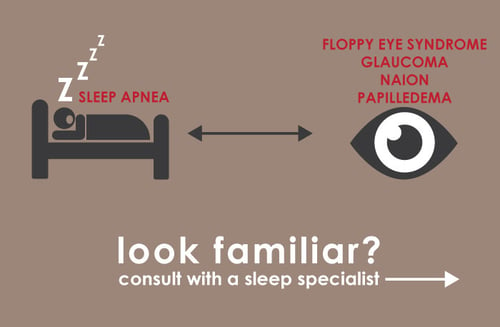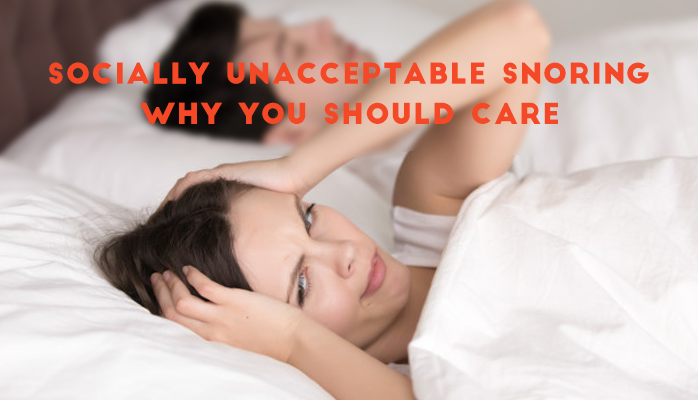Socially unacceptable snoring is a term for very loud snoring that is often so disruptive, you end up being the butt of your family's jokes. Socially unacceptable snoring is not only disruptive to the whole household, but my indicate a more serious underlying disorder. If your loud snoring requires your bed partners to wear earphones, happens consistently every night, and can be heard throughout the house, then it's not just a "quirky trait".
While socially unacceptable snoring may lead to humor or frustration among friends and family, it is crucial to recognize that it could signify a more significant issue for the snorer. It is not just an inconvenience for the bed partner; it is often a primary symptom of obstructive sleep apnea (OSA), a serious sleep disorder with potential health implications.
Understanding the distinctions between socially unacceptable snoring and potential OSA-related snoring is vital. Identifying the underlying cause of chronic snoring is the initial step towards addressing any health concerns.
Non-OSA Causes Socially Unacceptable Snoring
While socially unacceptable snoring may be caused by OSA, it’s important also point out that it can be simply be caused by:
- Being overweight
- Genetics
- Physical characteristics of face/nose/sinuses
- Smoking
- Alcohol
- OSA
- Sleeping on your back
Fixing your snoring can be as simple as learning to sleep on your back, or it could mean getting a sleep study, diagnoses, and wearing a CPAP device.
Let’s look further at OSA and OSA symptoms.
What is Obstructive Sleep Apnea (OSA)
Sleep apnea is a sleeping disorder and medical condition where you repeatedly stop breathing many times – about 40-100+ times throughout the night. Obstructive sleep apnea is the most common form of sleep apnea.
With OSA, you attempt to breath but are unable to due to some kind of physical ‘obstruction’ in your airway. Namely, this obstruction is caused by the relaxation of your breathing muscles and subsequent blockage by:
- Large tonsils blocking your partially open airway
- Your tongue cleaving to the roof of your mouth and blocking your airway
- Your fully closed airway
Each time this happens, called an apnea event or apnea, you stop breathing and eventually rouse awake to begin breathing again. You won’t remember ever waking up during the middle of the night, and it’s yoru bed partner who will likely notice your repeated apnea events.
In general, OSA often leads to:
- Lower quality of life
- Lower life expectancy
- Medical complications
Mild, Moderate, and Severe Obstructive Sleep Apnea
The process of stopping breathing and rousing (apnea events) can happen many times per hour. Here is the general categories used for mild, moderate, and severe OSA:
- Mild OSA: 5-14 apnea events per hour of sleep
- Moderate OSA: 15-30 apnea events per hour of sleep
- Severe OSA: 30+ apneas per hour of sleep
The risks and symptoms are still about the same with mild, moderate, and severe OSA, the only difference may be the prevalence and severity of the symptoms.
Signs Your Socially Unacceptable Snoring is Caused by OSA
Some telltale signs (OSA symptoms) that obstructive sleep apnea is causing socially unacceptable snoring are:
- Bed partner hears snorer repeatedly stop breathing throughout night
- Bed partner hears snorer repeatedly wake up gasping for air
- Snorer wakes up exhausted most days
- Snorer wakes up with headaches most days
- Snorer has many mood disruptions, such as constant irritability
- Snorer has low stress management
- Snorer struggles with depression or anxiety
Bed partners can instrumental in helping identify when socially unacceptable snoring is caused by OSA. As many bed partners can attest to, they could sit and count the seconds while their untreated OSA partner doesn’t breath throughout the night.
Diagnosing OSA can be a bit trickier without a bed partner, because it involves relying will have to identify other OSA symptoms that you may or may not be struggling with. If you live in Alaska and are concerned that you have OSA, getting a diagnoses is straightforward:
- Contact our sleep center or your healthcare practitioner
- Get a referral to get a sleep study (usually covered by insurance)
- Book appointment and conduct sleep study
- Our sleep center sends the results to your healthcare practitioner, who will discuss treatment options
CPAP devices as a treatment for OSA stop the snoring, which means a better night for you and anyone sleeping in your vicinity.


